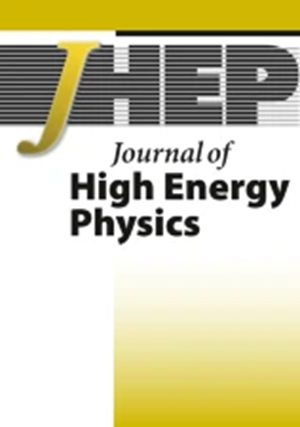Tachyons and Misaligned Supersymmetry in orientifold vacua
IF 5.5
1区 物理与天体物理
Q1 PHYSICS, PARTICLES & FIELDS
引用次数: 0
Abstract
A bstract We extend the analysis of Misaligned Supersymmetry to orientifold vacua. The lack of modular invariance in the Klein bottle, annulus and Möbius strip amplitudes implies that the IR properties of the physical spectrum are related to the UV behaviour of closed strings freely propagating between D-branes and O-planes, and vice versa . We thus build sector averaged sums 〈 d ( n )〉 associated to both representations of each Riemann surface. We find that the 〈 d ( n )〉’s associated to the loop channel control the coupling of closed-string tachyons to D-branes and/or O-planes, and therefore their vanishing is a necessary, but not sufficient, condition for stability in the closed sector. Similarly, the sector averaged sums associated to the tree-level amplitudes encode the presence of tachyons in the physical spectrum, and their vanishing is a sufficient, but not necessary, condition for classical stability. Using this technology, it is difficult, if not impossible, to formulate necessary and sufficient criteria for the absence of tachyons since, in orientifold vacua, they can be removed from the spectrum by the orientifold projection. Although in these cases one would naively expect a cancellation between 〈 d ( n )〉’s associated to different amplitudes, this does not occur in practice. We provide several examples in ten and lower dimensions supporting our results.取向折叠真空中的超对称性与超光速子
我们将对错位超对称的分析推广到取向褶皱真空。克莱因瓶、环空和Möbius条振幅中模不变量的缺乏意味着物理光谱的红外特性与在d膜和o面之间自由传播的闭弦的紫外行为有关,反之亦然。因此,我们建立扇区平均和< d (n) >与每个黎曼曲面的两个表示相关联。我们发现与环路通道相关的< d (n) > s控制着闭弦速子与d膜和/或o平面的耦合,因此它们的消失是闭扇区稳定的必要条件,但不是充分条件。同样,与树级振幅相关的扇区平均和编码了物理光谱中速子的存在,它们的消失是经典稳定性的充分条件,但不是必要条件。使用这种技术,很难,如果不是不可能,制定必要的和充分的标准,以不存在速子,因为在定向折叠真空中,它们可以通过定向折叠投影从光谱中去除。虽然在这些情况下,人们会天真地期望与不同振幅相关的< d (n) >之间的抵消,但这在实践中不会发生。我们提供了十维和更低维度的几个例子来支持我们的结果。
本文章由计算机程序翻译,如有差异,请以英文原文为准。
求助全文
约1分钟内获得全文
求助全文
来源期刊

Journal of High Energy Physics
PHYSICS, PARTICLES & FIELDS-
CiteScore
10.00
自引率
46.30%
发文量
2107
审稿时长
12 weeks
期刊介绍:
The aim of the Journal of High Energy Physics (JHEP) is to ensure fast and efficient online publication tools to the scientific community, while keeping that community in charge of every aspect of the peer-review and publication process in order to ensure the highest quality standards in the journal.
Consequently, the Advisory and Editorial Boards, composed of distinguished, active scientists in the field, jointly establish with the Scientific Director the journal''s scientific policy and ensure the scientific quality of accepted articles.
JHEP presently encompasses the following areas of theoretical and experimental physics:
Collider Physics
Underground and Large Array Physics
Quantum Field Theory
Gauge Field Theories
Symmetries
String and Brane Theory
General Relativity and Gravitation
Supersymmetry
Mathematical Methods of Physics
Mostly Solvable Models
Astroparticles
Statistical Field Theories
Mostly Weak Interactions
Mostly Strong Interactions
Quantum Field Theory (phenomenology)
Strings and Branes
Phenomenological Aspects of Supersymmetry
Mostly Strong Interactions (phenomenology).
 求助内容:
求助内容: 应助结果提醒方式:
应助结果提醒方式:


